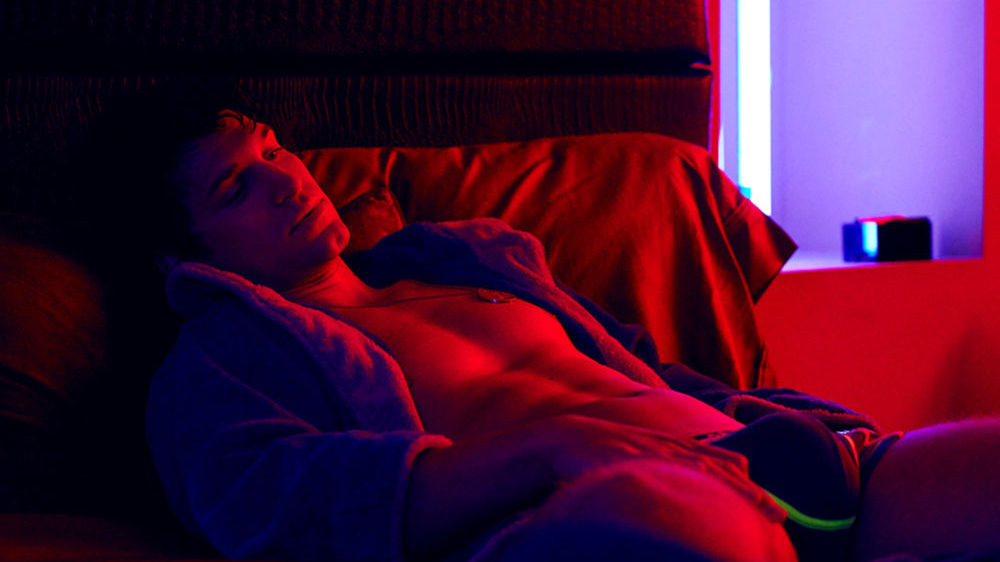
It is curious, if not entirely surprising, that a film about the vapidity of figures within the world of gay porn should be, itself, framed like a vapidly-produced gay porno. Are King Cobra’s kind of glossy, kind of showy, kind of shallow but not actually shallow performances intentional on the part of director and screenwriter Justin Kelly, who also did I Am Michael? Or are they an accident? Does it matter?
These questions aren’t irrelevant because of the way porn itself oscillates between the self-aware and the earnest. A lot of porn, including the kind of work that protagonist Brent Corrigan, nee Sean Paul Lockhart (Garrett Clayton) did exists within preset contexts and genres that are themselves predicated on a certain navigation of awareness.
A part of those generic conventions feel like tradition, but there is, at least within the context of Corrigan’s work at Cobra Video, and elsewhere, an enthusiasm for the one-dimensionality of the material. In the same way genre films can approach truths of humanity that other, less overt genre work will avoid or circumnavigate, genre convention-based porn seems to do something similar about human desire. It’s silly and ludicrous, but it’s not honest per se, but a kind of artifice that, underneath, reveals a kind of nasty authenticity when it comes to fantasy.
For Brent Corrigan, that fantasy was a paradoxical mix of youthful naiveté and a confidence and forth righteousness that was allegedly beyond his years (if only by, like, a decade or so). On camera, Corrigan himself bounces back and forth between those qualities, the role he’s conforming to a mishmash of archetypes that only work for actors and manic pixie dream characters. That’s his appeal, a boyishness that’s shed off the second a cock is on its way into his mouth. It’s the mystical power and trope of sex as the magical act of maturation; that banging someone can be a cocktail to retaining two supposedly antithetical personality qualities. Clayton is a human iteration of the sly look emoji [😏 -Ed.], embodying a noxious, self-satisfied, but willing to play innocent element that was core to Corrigan’s appeal.
Of course, the switching of roles and the artifice of that is the main thesis of Kelly’s film, as it was also examined in I Am Michael, at which James Franco was the center. And thus, the shaping and molding of identity and its treatment as the pet topic of interest is front and center, hardly hidden. To the best of his ability, Corrigan’s producer/sort of sugar daddy Stephen (based on Bryan Kocis, played by Christian Slater), tries to sculpt Brent as the ultimate gay porn star. “It’s fun to play with who we are, don’t you think?” Stephen says to Brent, a coquettishness laced in each syllable. But Stephen’s problem is you can’t really own someone like Brent in the first place; it’s not merely the issue of Brent finding his own autonomy, and it isn’t because he’s smart (he isn’t, really). It’s because you can’t control someone who isn’t really there in the first place.
There’s no authenticity in these people: in Stephen, who houses his production company in his cozy home in the middle of suburbia; in Brent, who lies to his mother about going on a filmmaking internship, nor in Cobra Videos’ not quite rivals, Joe (Franco) and Harlow (Keegan Allen) of Viper Boyz, who spend their workout periods lifting weights and unironically shouting, “No little bitches!” Everyone in the film looks in the mirror to see if any kind of core self is there, but the only thing present is a shell protecting an unsureness.
King Cobra seems to suggest, maybe tacitly or maybe outright, that if you play with your identity too much, you’ll lose it altogether.
Kelly has shot this film like it’s a porno, its shiny and shallow surfaces mostly devoid of stylistic interference save for key moments where neon is splashed onto the screen. The palette is both bright and muddy, and when you look through the lens of Stephen’s camera, the washed out quality of the look is heightened and sprinkled with digital grain. Outside of that monitor, the look could be compared to a video from Helix Studios.
But this could also be said of the acting style from everyone. The thing to discern is whether the kind of presentational quality is purposeful or accidental. Is there an ironic wink when James Franco shouts, “Fuck that twink” a good dozen times? Is Clayton trying to be meaningful when he says, “You can’t stop me from using my name”? Is Christian Slater in on the joke when spittle flies from his lips, yelling, “I own him” over the phone?
I think the answer to all of these questions is yes. Kelly seems to play with artifice in intentional and unintentional ways, but I think that might be the core issue of King Cobra, and it is with actual porn. Porn is only enjoyable for camp value in small doses, but when it slides into actual self-awareness about what it’s doing, it suddenly feels grating. That aspect, though, is more of a sidebar, because, unlike King Cobra, dramaturgy is almost never the center of what’s going to happen in a porno, and rarely on the mind of the viewer. The trajectory of interest shoots past acting and storyline beyond the general outline to the sex and what happens in the sex, which, given certain conventions can work to its benefit. King Cobra is a film that wants to be both Valley of the Dolls and Beyond the Valley of the Dolls: the former, an honest attempt at exploring the mental, physical, and emotional ravaging that the entertainment industry can do to you, but registering on a camp level to some audiences; and the latter a self-aware laceration of those ideas, and the very attempt to explore identity in any kind of meaningful way. And while there’s certain things to be enjoyed from the very uneven way that Kelly and company go about this, the film might be a testament that you can’t have an ass and eat it too.
—
Directed by Justin Kelly; written by Justin Kelly; based on the book Cobra Killer by Andrew E. Stoner and Peter A. Conway; starring Garrett Clayton, Christian Slater, Alicia Silverstone, Molly Ringwald, Keegan Allen, and James Franco; 92 minutes.



 Derek
Derek
 Isabelle
Isabelle